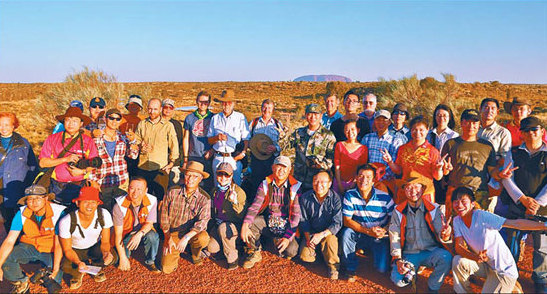First to the Outback, then back to Xinjiang
|
The expedition team arrives at the Uluru, the Ayers Rock, on Aug 28. Photo provided to China Daily |
An expedition of 26 members from China, Australia, New Zealand and Japan has completed a thrilling journey across the rolling dunes of Simpson Desert.
It is the most difficult part of their adventure across the Australian Outback, the largest terrestrial wilderness on the planet after Antarctica.
The adventure is part of the Intercontinental Australia-China Desert Adventure, in celebration of the 40th anniversary of diplomatic relations between China and Australia.
The first leg of the feat from Aug 26 to Sept 5 covered adventure in Australia Outback, while the second leg of the trip from Oct 11 to 20 will cover adventure in the highest desert in the world, the Kumkury Desert in Xinjiang Uygur autonomous region.
"I believe that the members will harvest friendships and display their teamwork when overcoming the difficulties on the adventure," says Bob Carr, Australia's minister of foreign affairs, at the reception in Sydney, before the start of the expedition.
"More importantly, they will set up a bridge for friendship between people of China and Australia."
The 3,200-kilometer journey across the Australian Outback is filled with danger as the members have to sleep in the open during the five days. Fortunately, the expedition did not encounter sand storms.
One of the aims of the explorers include creating awareness against desertification. Scientists who join the expedition conduct researches along the way to probe into the causes of desertification and find new preventive measures.
Chen Xiaomin, a gold medalist weightlifter during the 2000 Sydney Olympic Games, is a member of the brave expedition.
"The desert adventure is like another Olympics for me," says Chen, who is excited about the opportunity of returning to Australia.
She is determined to participate in the adventure despite from suffering waist injuries.
"It's a rare opportunity to cross the deserts, both in China and Australia. I want to play my part in environmental protection. It's high time that people pay attention to prevent desertification and protect the homeland (of those in the desert)," says Chen.
A Japanese member of the expedition, Toshiyuki Fujioka, a nuclear-power scientist says: "The earth is a whole. For example, the sand of the deserts in China's Inner Mongolia autonomous region will sometimes affect Japan and South Korea."
During the trip, they also visited the center of aboriginal culture and made an appeal to the world to resist desertification and protect the Earth.
Contact the writer at xujingxi@chinadaily.com.cn.



















